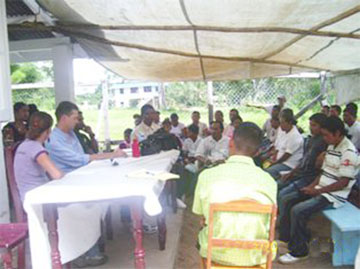Batavia is one of four beneficiaries of a British-funded regional project aimed at building capacity in sustainable forest management; starting at the community level.
According to a press release the Essequibo River community along with Kwebana in the North West, Pokigron and Marshall Creek in Suriname are benefiting from the 100,000 pounds project. The two-year project started in November 2007 and is being implemented by the World Wildlife Fund (WWF) in collaboration with the Guyana Forestry Commission (GFC).

At a recent community meeting Deputy British High Commissioner Simon Bond said it was crucial for the impact of the project to be sustained, in the national and global context. He said the government “was articulating a clear and compelling position on the importance of the standing forests in the fight against climate change, which the British Government strongly supported.” He also said as the value of forests become clearer and as steps are taken towards international financial mechanisms to assist forest countries like Guyana maintain their resources, it will also become increasingly important for those countries to be able to demonstrate effective governance of their forestry resources including showing that loggers are meeting best practice standards and that local communities including indigenous communities, are benefiting.
Under the project residents are being trained in best forestry practice including planning for the utilisation of forest resources, mapping and inventories of concessions, best extraction practices and laws governing the country’s forest resources. Currently, Batavia operates a concession of 800 hectares in the Upper Cuyuni River. The project is providing the expertise loggers need to derive maximum benefits from the forest with minimum damage to the environment.
From illegal logging
to permits
Many loggers practised their trade illegally. This left them vulnerable to exploitation by sawmill operators who cheated them on their measurements knowing that they could not complain to the authorities. Since the project started the community obtained the 800-hectare concession and was recently approved another larger concession, closer to the village, with fewer access and transportation problems.
One logger recalled that he was almost jailed after he was caught with a shipment of illegal logs that he had been taking to sawmills at Parika. He was subsequently fined and he lost the shipment; all his effort spent hacking the trees down with an axe came to naught. “I am trained to do the measurement, now I am not being robbed. Thanks to the project,” he said.
Under the project Murphy Gomes, a resident, was trained and funded as an extension officer. He now works with other loggers to ensure they comply with the GFC regulations. “We have benefited greatly from the programme…In the legal aspect we are preparing and submitting permits and paying royalties,” he said. Gomes said too loggers have been trained to track and use tags effectively. “In terms of logging we are doing less damage to the forest and in forest management planning, we are helping to plan for the future,” he added.
According to the release Batavia’s 315 residents including children, depend mainly on logging as an income earner with agriculture and mining supplementing their earnings.
The release said too Deputy Commissioner of Forests Tasreef Khan, the GFC’s Pradeepa Bholanath and the WWF’s Munirih Schanzenbaecher also attended the meeting. The meeting was held at the Batavia health centre.
